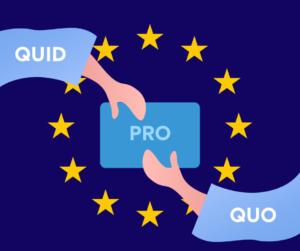Headquarters: Svetog Nauma 7, 11000
Office address: Đorđa Vajferta 13, 11000
Phone:: +381 11 4529 323

Until recently, when discussing Generation Z, they were often referred to as an apolitical group of young people who lived more in the digital than the real world. Zoomers, as they are also called, were mostly born after the dates that defined modern history and political trends in Serbia, such as 24 March 1999, 5 October 2000, or 12 March 2003. Entering the stage of the twenty-first century unburdened by the legacy of the 1990s, their growing-up period was accompanied by the rapid and unprecedented development of modern technology, such as the internet and smartphones. Under such circumstances, they were often criticised for being too preoccupied with their mobile phones and computers and for not fully grasping the general needs of the society they live in. Millennials and boomers had already given up on them.
Despite this, the end of 2024 and the beginning of 2025 undeniably belonged to students, that is, Generation Z. Protests in Serbia, much like the rise of technology, also experienced a rapid and extraordinary transformation. After the collapse of a canopy in Novi Sad on November 1, 2024, Zoomers felt compelled to take matters into their own hands. “Plenums” became a well-known term for places where decisions began to be made more peacefully and effectively than in parliamentary seats. Willing to sacrifice their exam periods, students of various orientations—whether left or right, pro-European or pro-Russian—demonstrated their readiness to prove to millennials and boomers that they were prepared to take the baton and fight for change in a manner different in both method and scope from all previous efforts.

Despite their differences, it became evident that their minimal common denominator—the rule of law—was enough to overcome potential ideological disagreements among students. This should not be taken for granted, especially considering that students of history, law, sociology, philosophy, political science, and international relations have often clashed over their specific worldviews, losing opportunities to make a visible impact. With a newfound ability to bridge their differences, they managed to demonstrate not only the strength to control political discourse and dominate the agenda—successfully “enduring” the winter (a frequent destroyer of protester spirit)—but also showed many sceptics that they were indeed ready to lift their gaze from cell phones and observe the society around them.
Zoomers, throughout their formative years, have known only one regime. Boomers and millennials had the opportunity to change regimes and systems, whether institutionally or non-institutionally, and often found themselves disappointed by the changes that followed. Zoomers have not yet had the chance to change anything, let alone become disillusioned with something new. Their goal now is to effect change, leaving thoughts of potential disappointments for later. A common chant at protests has been: “It’s important to keep it circulating; we’ll replace the next ones as well in the streets if necessary”. With such a mindset, accompanied by evident courage not to back down in the face of hooligan attacks or reckless drivers, they have encouraged other segments of the population to join them—not for a change of government, but to put the rule of law at the forefront.
The culmination of this movement was seen in the general strike on 24 January 2025, when many schools, restaurants, cafes, civil society organisations, lawyers, and others decided to halt work—not just for 15 minutes to honour the deceased, but for the entire day. Through massive citizen participation across Serbia, it became evident that plenums had become the centre of newfound street power—of questionable legality but undeniable legitimacy. For Serbia, a country rich in the history of demonstrations, this type of strike, which took place in varying degrees across most municipalities and cities in the country, only proved that students could no longer be the so-called “elephant in the room”. Regardless of previous doubts about their worldviews and willingness to take action, they demonstrated that they could no longer be ignored.
Although it remains uncertain how long their struggle will last and to what extent they will achieve their demands, one thing is certain—Zoomers have permanently changed the perception of themselves and laid the foundation for the generations to come.
Originally published on the EUupravozato.